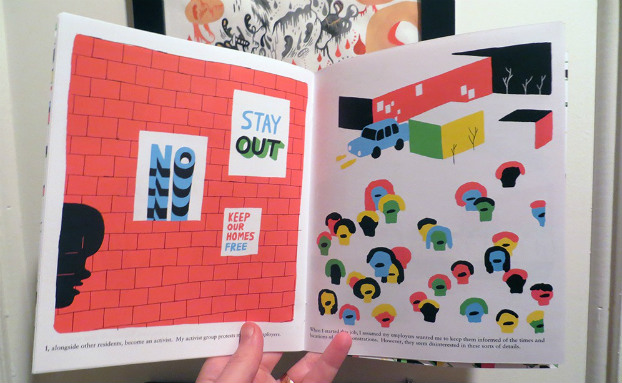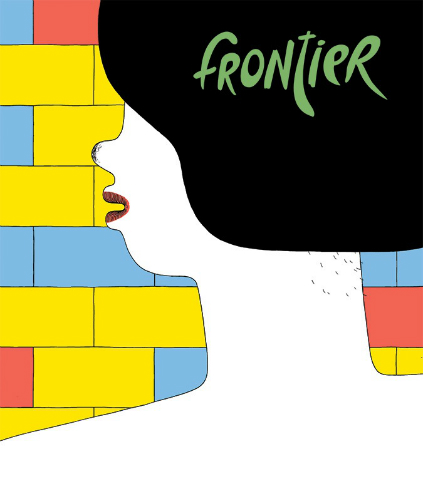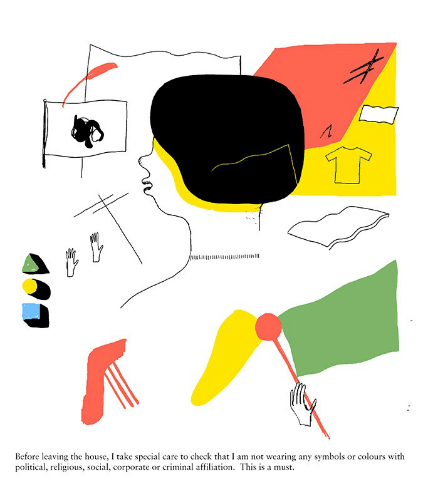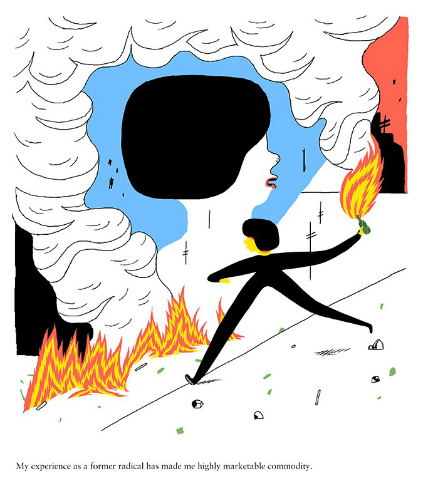Youth in Decline’s Frontier series of self-contained one-shots continues to spotlight some of the most compelling and diverse voices in contemporary indie comics across the globe. Its distinctive ethos has dictated from the beginning that format and presentation are fluid concepts in regards to showcasing the talents that grace its pages. Its tenth issue underlines that philosophy with Canadian artist Michael DeForge’s story ‘Sensitive Property’ arguably being more strictly defined as an illustrated short story rather than comics per se.
A tale of social subterfuge and insidious corporate infiltration, ‘Sensitive Property’ details the activities of a former radical who has now become a “consultant” for a real estate company. Years before large sites are scheduled to be developed she moves into the community, integrating herself into it, starting a family, and becoming a vital yet never ostentatiously visible part of the locality.
When the time eventually comes that the residents discover their homes are under threat she works from within to destabilise their protests. On some occasions that can be by pushing their efforts to extremes, splintering their opposition to the property developers, and causing conflicts between the moderates and more volatile elements. Alternatively she undermines resistance by re-channelling their efforts on multiple fronts, and decreasing its efficacy through a lack of focus.
DeForge’s story is all the more chilling for its matter-of-fact first person narration and the casual indifference of its central character. Her subtle manipulation of those around her – whose trust she has built up over the years – displays a level of understatement that makes it particularly sinister in portrayal. Indeed, DeForge ensures that the reader feels almost complicit in her actions; passively observing her underhanded behaviour as she manoeuvres people like game pieces.
What is so undeniably effective about Frontier #10’s narrative, then, is the way in which DeForge entrenches the readership in the agenda of such an unsympathetic figure. This is exemplified by his single illustration page designs which, by the placement of the central character in many of the images, seems to underline to the reader her sense of “otherness” in the society she has infiltrated; a presence that is both at odds with its surroundings and yet disquietingly assimilated within them.
It’s one that provokes sensations of both intense involvement and yet powerless detachment in the audience, and provides a constant reminder of how the pernicious influence of one individual can be just as destructive a tool as the sledgehammer force of a corporation. Elements of the psychogeographical also abound – a sense of what a community invests in an area in emotional terms is counterpointed with the machinations of those who perceive it simply as a commodity, and the lives of its inhabitants as an obstruction.
DeForge’s carefully constructed representational imagery is also all the more affecting for its detachment from realism. Events are quietly transcribed through his soulless and cynically pragmatic main player with reactive moral indignation being left as the responsibility of the readership.
Frontier #10 once again proves what a vital platform this series has become for both celebrating the work of some of the most important practitioners on the current independent comics scene and providing an accessible entry point for those yet to discover their work. These essential one-shots should be at the very top of every discerning comics enthusiast’s pull lists. Frontier is, quite simply, a quarterly love letter to the possibilities of the form.
For more on buying copies of Frontier check out the Youth in Decline online store here and follow them on Twitter here. You can visit Michael DeForge’s site here and follow him on Twitter here.
For regular updates on all things small press follow Andy Oliver on Twitter here.


















